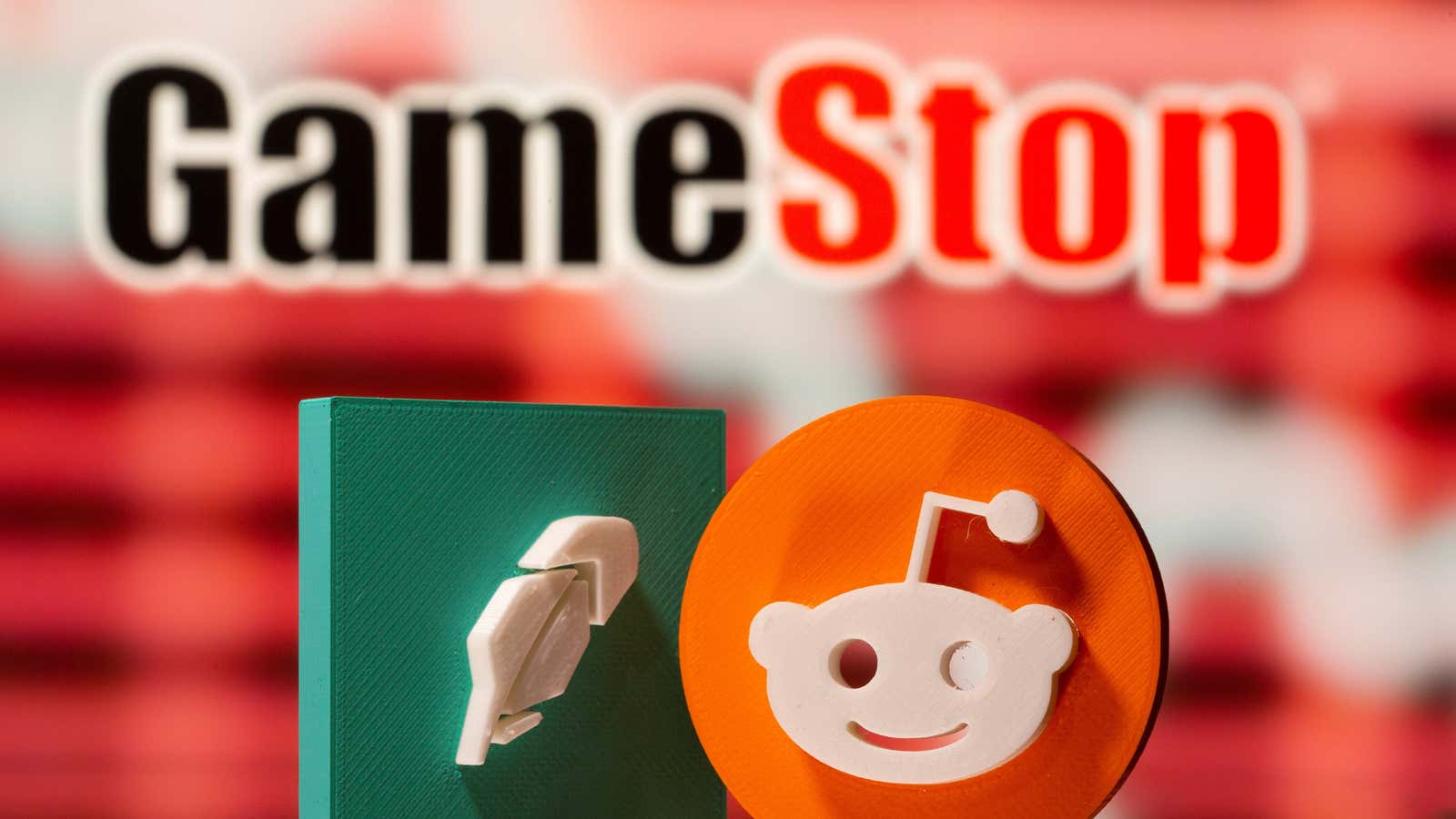When the GameStop saga started blowing up on Reiss Jeram’s phone, the 18-year-old actor was shocked by the video game seller’s skyrocketing share price. Then the Londoner was intrigued by what seemed to be an army of retail traders taking a principled stand against Wall Street.
Jeram had already made a New Year’s resolution to get into investing, but it was GameStop that inspired him to pull the trigger. “Obviously being on Reddit, on social media, it’s more accessible, and people are thinking, OK, so this is clearly a viable way of profit,” he said in a phone call.
Jeram is far from alone. Retail trading was already booming in the US and gaining traction in other parts of the world, and the GameStop story turbocharged the trend. Freetrade, the UK-based brokerage app Jeram uses, says daily signups surged from 3,000 before GameStop to as many as 30,000 when news was at a fever pitch. BUX, a Dutch brokerage, said it was onboarding three times as many new customers during the GameStop controversy. Downloads also jumped in Brazil, Japan, and Germany, a country that has been culturally wary of the stock market, according to Apptopia.
Young guns
There are signs that the latest cohort of non-US retail traders may be younger and newer to investing. Take Stake, for example. The Australian brokerage has users from Latin America to New Zealand and the UK, and it says the average age of its customers was 29.9 at the end of last year; so far in 2021 the average of its new users is 27.5. It has gotten more than 100,000 signups in the past two months, which is as many as joined in its first three years of operation. Some 25,000 of its new customers came in the past two weeks.
Not everyone who was enticed into trading by the GameStop story is in their 20s, of course. Jordan Pini, 31, who works in sales for Amazon in London, has been investing for the past decade. He started out buying stocks using a bank brokerage in Australia, where he’s from.
Until recently he had never been on Reddit, and says he would typically be wary of getting financial advice from social-media. Pini used Stake to bet on GameStop, which was mostly about banter and lockdown entertainment, and says he was impressed by how slick the brokerage tech has become, making it much easier to access markets. It also made him think he should be using it on a long-term basis.
“I got into it with my housemate and a couple of our other friends, and I think we all felt the same in that it was refreshing to feel like the little guy could stand up to the big bad boys of Wall Street,” Pini said. “You as this small punter could have an impact on the biggest financial market in world.”
These popular narratives matter: They can change the direction of the economy, and can help drive booms as well as depressions, according to Robert Shiller, who won a Nobel prize for his work analyzing financial bubbles. “We must start understanding how ordinary people, not economists, change, because they make most of the economic decisions,” he said in September during an online event hosted by the London School of Economics. He says human interest stories, with their morals and lessons, are among the most powerful narratives.
Leveling up

The retail trading boom isn’t new, but GameStop took it to a new level. The tsunami started to build in late 2019 when a price war among US brokerages stomped out trading commissions. The sensation got a boost after the Covid-19 pandemic shot a hole in the stock market, giving rise to bets that it was a chance to buy stocks on the cheap. It also didn’t hurt that many people were locked down because of the pandemic, with little to do, and those who still had jobs saw their bank accounts swell. The stock market became an outlet for the extra time and money. The enthusiasm for fee-free trading apps has spread outside the US, where retail investing is far less commonplace.
Before long another story was making the rounds: the idea that lockdowns and social distancing had sped up our digital future. Shares of videoconferencing sensation Zoom and food-delivery Ocado flew off the charts.
Then GameStop came along. The Grapevine, Texas-based company’s shares had drifted lower in recent years amid a broader shift from physical stores and malls to online sales. As short-selling hedge funds ramped up bets that its stock would decline, traders on Reddit’s WallStreetBets figured, correctly, that the institutional investors had left themselves exposed to a short squeeze. An army of Redditers was able to drive up the price of GameStop stock, costing hedge fund billions of dollars in losses. Heavy trading in options supercharged the volatility, and professional traders almost certainly piled into the action.
“It was nice to see that a bunch of Redditers, like my age, had banded together, or put their money into this one share,” Jeram said. “It did prove to me how powerful social media is, and what it can do linked in to trading.”
Social media is part of what got Jeram interested in investing in the first place. One of the people who inspired him is Ali Abdaal, a YouTuber in Cambridge with 1.4 million subscribers. Abdaal, who says he makes more money from YouTube than he did as a junior doctor with the UK’s National Health Service, often posts about productivity, how to make money online, and study tips for students. But he also has a video about how he got started “with this investing thing,” in which he breaks down the basics of index funds and savings. Something that stuck with Jeram was the fact his savings were being eroded by inflation, and that investing could be a way to protect them.
“Seeing how much people were making off of single trades, it’s like, right, this does work, there’s a method to this and there’s a way to do this correctly,” said Jeram, who has appeared in shows on Amazon Prime, Netflix, and BBC.
Taras Mogetich, 21, got started in investing by learning from YouTubers like Pree Market, and he’s a fan of Cathie Wood of ARK Invest, the star stock picker who made seemingly prescient bets on Tesla.
But the GameStop story didn’t really speak to him. He didn’t think the company had much in the way of future prospects, and he felt the same about AMC, the hard-hit cinema company that’s been a favorite on the forum. For Mogetich, who works in IT and lives outside London, it was the Covid crash in March 2020 that brought him in. He started investing in May and by November was trading more frequently using the the brokerage app Stake.
“The big factor was the decrease in valuations, seeing the whole market at a discount,” he said. “I thought, OK, it’s a good time to set aside some money and get involved in the world of investing.”
The next stop
GameStop fever seems to be cooling, if trading-app downloads this month are any indication. But retail brokerages are stocked up with a fresh batch of traders who could keep buying and selling even as that story fades.
When I interviewed Jeram this week, he said he had put about £70 ($96) into GameStop and that his position was, at that moment, in the red. (Shares were changing hands at about $50 on Feb. 9, down from about $90 a week ago and a closing high of $347 on Jan. 27.) He said the memes were still circulating on Reddit, so he was going to follow the social media trend for now. He’s also also interested in crypto assets like bitcoin, but thinks he needs to do more research on those. If all goes well, he’s hopeful that investing can help make up for some of the turmoil in the acting the business.
